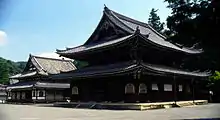Kenryaku
Kenryaku (建暦) was a Japanese era name (年号,, nengō,, lit. "year name") after Jōgen and before Kempo. This period spanned the years from March 1211 through December 1213.[1] The reigning emperor was Juntoku-tennō (順徳天皇).[2]
| Part of a series on the |
| History of Japan |
|---|
 |
Change of era
- 1211 Kenryaku gannen (建暦元年): The new era name was created because the previous era ended and a new one commenced in Jōgen 2, on the 9th day of the 3rd month of 1211.[3]
Events of the Kenryaku era
- 1211 (Kenryaku 1, 1st month): Shōgun Sanetomo's position at court was raised to the 1st rank of the 3rd class.[4]

Sennyū-ji established in 1211
- 1211 (Kenryaku 1, 1st month): The Buddhist priest Hōnen returned to Kyoto from a period of exile. He was the founder and guiding force behind the early development of the Sennyū-ji (泉涌寺,, Sennyū-ji) temple-complex.[4]
- January 12, 1212 (Kenryaku 2, 20th day of the 12th month): The Buddhist priest Hōnen died at age 80, mere days after drafting a brief, written summary of his life teachings. This last written document is known as the One-Sheet Document (ichimai-kishomon).[5]
- 1212 (Kenryaku 2, 16th day of the 1st month): The former-Senior High Priest Jien (1155–1225) was appointed Tendai Abbot by Imperial Mandate. He would administer Mt. Hiei for one year before yielding the position on the 11th day of the 1st month of 1213.[6]
Notes
- Nussbaum, Louis-Frédéric. (2005). "Kenryaku" in Japan encyclopedia, p. 510; n.b., Louis-Frédéric is pseudonym of Louis-Frédéric Nussbaum, see Deutsche Nationalbibliothek Authority File Archived 2012-05-24 at archive.today.
- Titsingh, Isaac. (1834). Annales des empereurs du Japon, pp. 230-238; Brown, Delmer et al. (1979). Gukanshō, pp. 341-343; Varley, H. Paul. (1980). Jinnō Shōtōki. pp. 221-223.
- Brown, p. 341.
- Titsingh, p. 230.
- Titsigh, p. 231; Jodo Shu web site
- Brown, p. 342.
References
- Brown, Delmer and Ichiro Ishida. (1979). The Future and the Past: a translation and study of the 'Gukanshō', an interpretative history of Japan written in 1219. Berkeley: University of California Press. ISBN 978-0-520-03460-0; OCLC 5145872
- Kitagawa, Hiroshi and Bruce T. Tsuchida, eds. (1975). The Tale of the Heike. Tokyo: University of Tokyo Press. ISBN 9784130870245; ISBN 9784130870238; ISBN 9780860081883; ISBN 9780860081890; OCLC 193064639
- Nussbaum, Louis-Frédéric and Käthe Roth. (2005). Japan encyclopedia. Cambridge: Harvard University Press. ISBN 978-0-674-01753-5; OCLC 58053128
- Titsingh, Isaac. (1834). Nihon Odai Ichiran; ou, Annales des empereurs du Japon. Paris: Royal Asiatic Society, Oriental Translation Fund of Great Britain and Ireland. OCLC 5850691
- Varley, H. Paul. (1980). A Chronicle of Gods and Sovereigns: Jinnō Shōtōki of Kitabatake Chikafusa. New York: Columbia University Press. ISBN 9780231049405; OCLC 6042764
External links
- National Diet Library, "The Japanese Calendar" -- historical overview plus illustrative images from library's collection
This article is issued from Wikipedia. The text is licensed under Creative Commons - Attribution - Sharealike. Additional terms may apply for the media files.